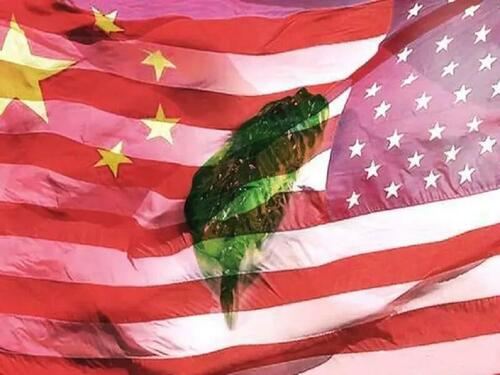The Recent Sino-US Dispute Over Taiwan’s Post-WWII Status Is A Sign Of The Times
Authored by Andrew Korybko via Substack,
The US’ de facto embassy in Taiwan emailed Reuters a statement in mid-September criticizing China’s reliance on WWII-era agreements in support of its claim to the island.
They declared that “China intentionally mischaracterises World War Two-era documents, including the Cairo Declaration, the Potsdam Proclamation, and the Treaty of San Francisco, to try to support its coercive campaign to subjugate Taiwan.” The latest twist in this dispute coincides with the 80th anniversary of Japan’s defeat.
For background, the 1943 Cairo Declaration states that Formosa (Taiwan’s colonial-era name) will be returned to the Republic of China (ROC); the 1945 Potsdam Declaration references Cairo and limits the geographic scope of Japanese sovereignty without mentioning Formosa; and the 1951 Treaty of San Francisco resulted in Japan officially renouncing its claim to Formosa while leaving its status unresolved. The ROC’s and People’s Republic of China’s (PRC) interpretations thereof will now be briefly summarized.
The Taiwan-based ROC considers itself to be China’s only legitimate government since it represents the League of Nations-recognized ROC despite that erstwhile organization’s UN successor expelling them in 1971 and replacing their permanent Security Council seat with the PRC. It thus interprets the Cairo and Potsdam Declarations as confirming its control over Taiwan while the PRC relies on the aforesaid decision, which recognized it as the only legitimate representative of China, to legally claim Taiwan.
The significance of the US’ de facto embassy in Taiwan criticizing China’s (formally the PRC’s) reliance on these WWII-era agreements (Reuters reminded readers that it considers the Treaty of San Francisco “illegal and invalid” since it wasn’t party to it) is that it’s a sign of the times. As the New Cold War shifts from the US prioritizing Russia’s containment in Europe to China’s containment in Asia, so too is the trend of the US gradually revising the results of WWII in order to give it an edge on that front too.
Russia believes that Germany’s remilitarization, Finland’s membership in NATO, and the push for neutral Austria to follow, all of which are backed by the US, prove that the US is gradually revising the results of WWII. Likewise, so too does it believe that Japan’s US-backed remilitarization is proof of the same, the view of which China shares as well. It was therefore predictable that the US would one day start to more assertively challenge China’s reliance on WWII-era agreements in support of its claim to Taiwan.
The world order always changes as history attests, but in these instances, associated processes are being weaponized by the US for containment purposes vis-à-vis what can nowadays be described as the Sino-Russo Entente in order to justify more aggressive policies against them on false legal bases. Permanent UNSC members Russia and China obviously wouldn’t agree to the abovementioned revisions, hence why the US is backing them unilaterally, which further accelerates the collapse of the post-WWII order.
The ideal scenario as envisaged in the UN Charter is for the UNSC to jointly pioneer a controlled transition to a new order that preserves the balance of power between them so as to reduce the risk of conflict during this period. That became impossible after the US’ unilateral withdrawal from arms control pacts with Russia dismantled the global security architecture, however, which inevitably led to it gradually revising the results of WWII and dangerously raising tensions with the Sino-Russo Entente.
Tyler Durden
Sat, 10/11/2025 – 22:10ZeroHedge NewsRead More





 R1
R1
 T1
T1


